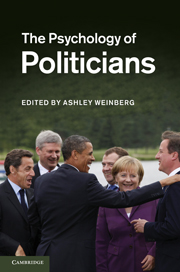Book contents
- Frontmatter
- Contents
- Figures
- Tables
- Acknowledgements
- Contributors
- 1 The psychology of politicians
- Part I Becoming politicians
- Part II Being at the centre of things
- 4 What makes a successful politician?
- 5 Cognitive skills and motivation to adapt to social change among Polish politicians
- 6 Political leadership and its development
- Part III Coping with pressure?
- Part IV People as politicians
- Index
- References
6 - Political leadership and its development
Published online by Cambridge University Press: 05 December 2011
- Frontmatter
- Contents
- Figures
- Tables
- Acknowledgements
- Contributors
- 1 The psychology of politicians
- Part I Becoming politicians
- Part II Being at the centre of things
- 4 What makes a successful politician?
- 5 Cognitive skills and motivation to adapt to social change among Polish politicians
- 6 Political leadership and its development
- Part III Coping with pressure?
- Part IV People as politicians
- Index
- References
Summary
Introduction:
The literature about political leadership is relatively sparse, and somewhat disparate, across psychology, sociology and political science, with relatively few studies taking an integrative approach (Hartley and Benington, 2011; Morrell and Hartley, 2006). In that sense, not much has changed since the comment by one of the founders of the leadership field, Stogdill, who noted: ‘Leadership in various segments of the population (students, military personnel and businessmen) [has] been heavily researched while others (politicians, labour leaders, and criminal leaders) have been relatively neglected’ (quoted in Blondel, 1987, p. 1). In the generic leadership literature, charismatic and highly visible leaders, such as J. F. Kennedy, Thatcher or Mandela, are widely quoted as examples of leadership, but only rarely is the political, policy and public context of their work acknowledged (though see Burns, 1978; Heifetz, 1994; Tucker, 1995). Instead, they are often treated as examples of typical – if somewhat heroic – leadership and the distinctiveness of their political leadership occluded. On the other hand, the disciplines concerned with politicians, such as political science and public administration, have neglected political leadership in part with their greater focus on institutions and regimes, and also because the traditional view was that politicians (national and local) make policy while public servants executed that policy, leaving little room for leadership (Hartley, 2010a; Behn, 1998). For politicians, leadership, other than by very senior figures such as prime ministers and presidents, was not countenanced because their work was mandated by their political party, their manifesto and the electorate. Leadership development was also irrelevant because performance would be judged at the ballot box, and in the interim, at the despatch box.
That situation has changed quite substantially, at least in the UK, from the early 1990s. The worldwide interest in public sector reform (Pollitt and Bouckaert, 2004) has been accompanied by a language more receptive to the idea of leadership. This is partly because there is now a recognition that public policy and public management needs to go beyond traditional hierarchical administration and beyond ‘new public management’, with the more recent paradigm shift to ‘networked governance’ (Benington, 2000; Stoker, 2006b; Newman, 2001). Within networked governance, it is widely recognised that public sector renewal has resulted in a weakening of the hierarchically organised state in favour of more differentiated partnership arrangements that cut across the boundaries of the public, private and voluntary sectors. Additionally, governance is polycentric in that governance operates simultaneously across different tiers or levels of government (Benington and Hartley, 2009). Managing the tensions and paradoxes of these governance regimes has become the order of the day for politicians and public managers, strengthening the need for leadership (Pedersen and Hartley, 2008). Political leadership is increasingly important to deal with the complex cross-cutting problems of society (Benington and Hartley, 2009) and to work within such polycentric, networked governance arrangements.
- Type
- Chapter
- Information
- The Psychology of Politicians , pp. 97 - 120Publisher: Cambridge University PressPrint publication year: 2011
References
- 2
- Cited by

